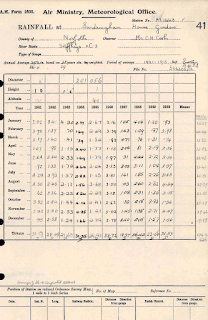UK Met office has preserved rainfall data from 1820.
It contains 3.5 million data points. Once digitized, it would vastly help
improve future weather predictions and climate modeling. Unfortunately, this
data was handwritten. Though scanned, even the best OCR (Optical character
recognition) programmes confuse between 1 and 7, 3 and 8. By March end,
expecting people to have more time in a lockdown, the Met launched a Rainfall rescue project. They expected
it would take 16 weeks. A total of 65,000 handwritten pages needed to be
digitized. The project was finished in only 16 days, with 16,000 volunteers
contributing from home.
*****
Various online platforms facilitate crowd searching to
solve mysteries. Find missing people. Catch criminals. Detect war crimes in
Gaza. Analyze earthquakes. Estimate the damage in Syria. Identify nuclear
warheads in North Korea. Citizen science projects and virtual volunteering are
booming in lockdowns.
Tracelab is a Canadian non-profit platform. Their
April event attracted 550 participants scrutinizing 15 cases of missing people,
generating 8000 new leads. In an earlier event, one participant spent hours
studying YouTube footage to discover a clip where the missing person was
entering a car. Investigators had missed it. The police traced the car, and
found the missing person living there.
*****
Europol has launched ‘Stop child abuse – trace an object’ where more than 40 million
images (clothes, toys) related to child sexual abuse are available. Public is
requested to trace the location/country of origin of the items. Through this
platform, ten victims were identified, and two offenders successfully
prosecuted.
*****
Hacking is not allowed. Volunteers must use
information available in the public domain. But with platforms like Google
Earth any satellite imagery can be sourced. With tools like Quantum GIS or Planet,
that imagery can be processed and analyzed. Most of these tools are free. From
your chair, you can access most satellite images of everything that is outdoors.
The world now has too much electronic data, and not enough volunteers to
explore it.
After the disappearance of the Malaysian Airlines
flight MH 370, an area of more than 1 million sq. km needed to be explored.
More than 10 million volunteers contributed to the hunt. Tomnod, a platform,
had allocated a small geographical piece to each of them.
*****
Zoouniverse has several interesting projects any of us
can contribute to, without leaving home. You can help find rural homes in Africa that have no electrical access. (By comparing images in day time and
night time). A project ‘spot slavery from space’ identifies the location and
scale of brick kilns in India and Pakistan. The assumption is that many workers
at the kilns are bonded labourers. If you love nature, you can start tracing
changes in the coastal environment by identifying marine invertebrates. If you
love sound, you may want to listen to and analyse the seismic sounds of earthquakes.
Historically, lady doctors and scientists have been unnamed. One photo from an
earlier century shows Dr Michael Somyogi, and his five unnamed women doctor
colleagues. Online volunteers have so far found the name of one of them.
*****
Collective effort can work miracles. Wikipedia is
probably the best example of what crowdsourced projects can achieve.
The online detective work on Zoouniverse, Europol,
Tracelab or Maxar will bring you neither money nor fame. But you can contribute
to some good in the world. The joy and purpose of investigation is a reward for
the soul. Trapped in your house, it may be an activity more fulfilling than
watching Netflix or playing video games.
Ravi









